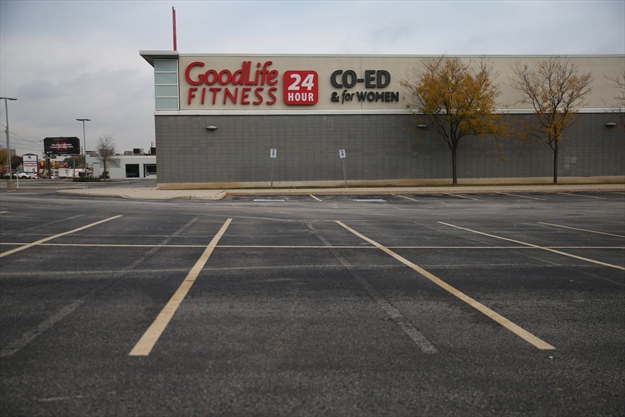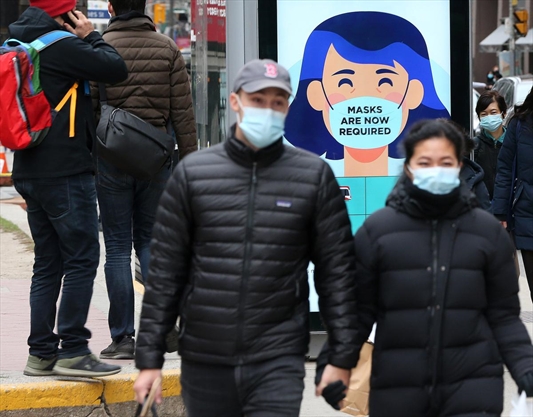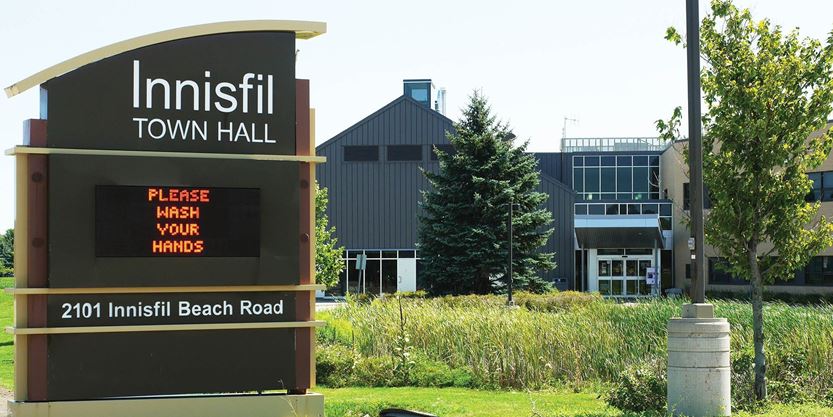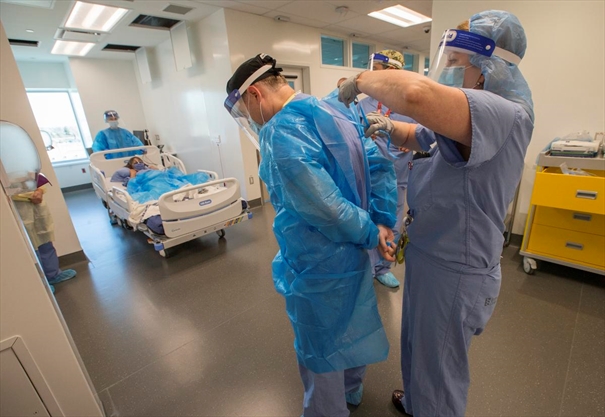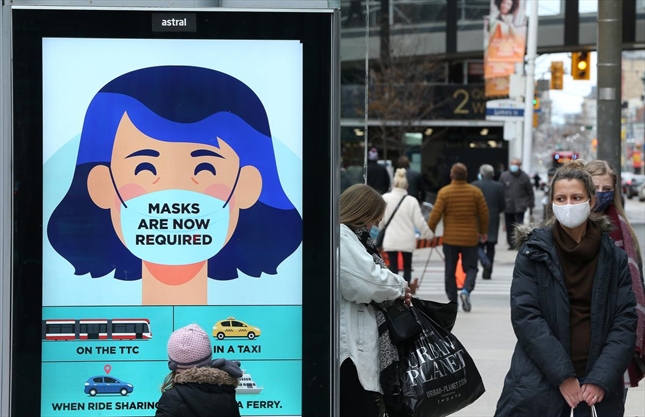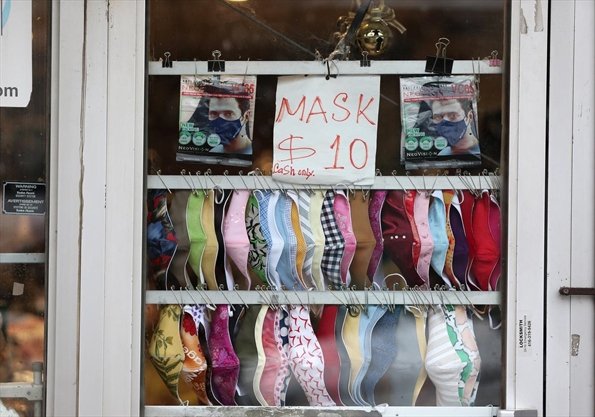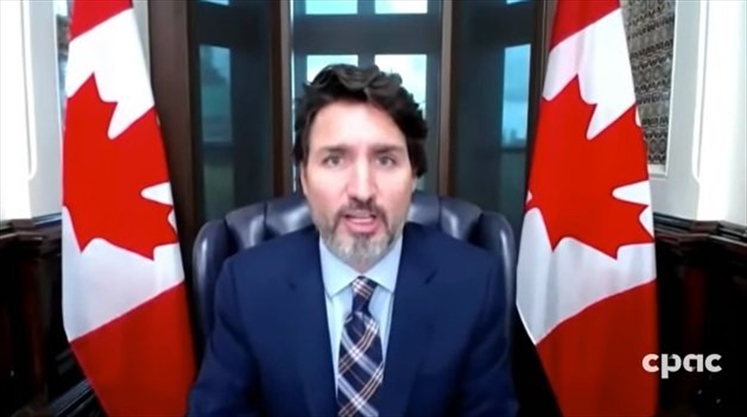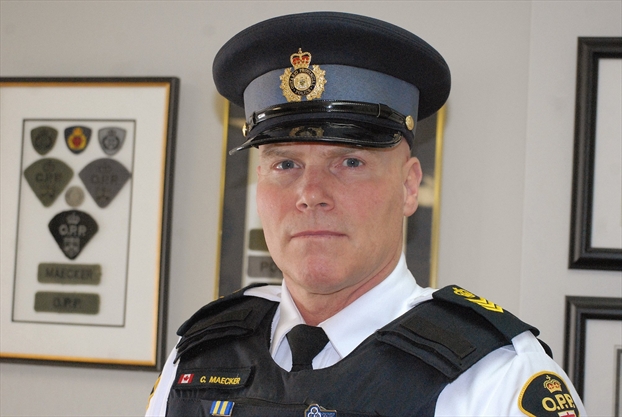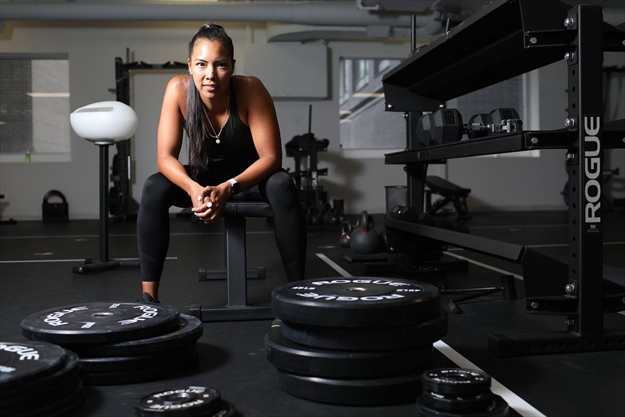The latest news from Canada and around the world Wednesday. This file is no longer updating. Web links to longer stories if available.
10:03 p.m.: South Korea has recorded more than 500 new coronavirus cases in 24 hours for the first time in about eight months as health authorities struggle to contain a third surge of infections.
The Asian nation has been experiencing a spike in cases since it relaxed stringent social distancing rules last month. To deal with the latest surge, the country on Tuesday re-imposed tough distancing guidelines in Seoul and some other areas.

South Korea’s cases initially peaked last February and March, with officials reporting hundreds of fresh cases daily, mostly tied to a religious sect. Its second major outbreak came during the summer, and was mostly tied to the greater Seoul area.
Officials say the latest outbreak is worrisome because there are many cluster infections tied to a variety of sources.
10:00 p.m.: Four national interest exemptions to COVID-19 border restrictions, covering 1,300 professional athletes, have been issued by the federal immigration minister, his office confirmed Wednesday.
The details came after MPs at the House of Commons immigration committee were told by departmental officials that 1,300 national interest exemptions had been issued.
Immigration Minister Marco Mendicino’s office was forced to clarify late Wednesday the details of the national interest exemptions he’s authorized after the number surfaced at a House of Commons immigration committee hearing earlier in the day.
Mendicino was grilled on how many people had been allowed into Canada using the exemption, which admits those who don’t qualify under current COVID-19 related restrictions, or to skip the mandatory 14 day quarantine when they arrive.
Who has access to that program has been a source of public debate, especially throughout the summer and fall as thousands of families placed sustained public pressure on Mendicino to loosen the border restrictions to allow more families to reunite.
8:24 p.m.: Toronto officials are taking steps to fight vaccine hesitancy to ensure that as many people as possible take part in immunization programs when they become available in early 2021.
City council voted on Wednesday to ask Toronto’s COVID-19 Immunization Task Force, in coordination with the provincial and federal governments, to promote the safety and efficacy of vaccinations.
The motion was one of several amendments to a COVID-19 motion passed by council on Wednesday as it grapples with flattening the second wave of the disease while ensuring that the massive vaccination program, when it is launched, runs as smoothly as possible.
8:11 p.m.: Provincial health officials say they are working on British Columbia’s plan to handle COVID-19 vaccines.
Dr. Bonnie Henry, the provincial health officer, says Dr. Ross Brown of Vancouver Coastal Health will join the group working to organize the logistics around the distribution of vaccines.
and 738 new cases of COVID-19 on Wednesday, bringing the total to 29,086.
Henry says front-line workers as well as those in long-term care homes will likely have priority for vaccinations.
“It’s very much focused on who is most at risk and how do we protect them best,” Henry said. “There’s a lot of discussion that needs to happen.”
Henry said they hope to have vaccines by January 2021.
8:03 p.m.: The Saskatchewan government is suspending team sports for the next three weeks and slashing capacity limits for public venues to 30 people in its latest attempt to curb the spread of COVID-19.
Premier Scott Moe announced the new health measures Wednesday by video from his home in Shellbrook, Sask., where he was isolating after eating at a restaurant where someone infectious had been.
Health officials reported 164 new cases of COVID-19 on Wednesday and said hospitalizations had risen to 111, with 19 people in intensive care.
The premier said the province’s seven-day average of 214 daily cases is too high.
7:35 p.m.: As , Alberta Health services is bracing for more cases by making 400 ICU beds and 2,000 acute care beds available to COVID-19 patients.
On Wednesday afternoon, Alberta Chief Medical officer of Health Dr. Deena Hinshaw said the province has reached a grim milestone of 500 deaths, with another 1,265 COVID-19 cases diagnosed overnight.
“This is a tragic milestone. My sympathies go out to the loved ones and friends of these individuals who are mourning the lives lost during what is a very difficult time to grieve,” Hinshaw said.
Overall, the province has 13,719 active cases with 355 people in the hospital and 71 in intensive care. Alberta has passed 50,000 COVID-19 infections since the beginning of the pandemic, which accounts for 1.2 per cent of Albertans.
7:30 p.m.: Wednesday, Doug Ford appeared to be under siege, writes Star columnist Bruce Arthur. He attacked Ontario’s auditor general, who had that morning on the province’s response to the COVID-19 pandemic, and traced how it has been cumbersome, reactive and political.
The premier was not happy. The premier blew his top. Ford has always loved savaging watchdogs, all the way back to Toronto city hall.
“I’m really glad the auditor general just got a health degree and became a doctor over the last year or so,” Ford later said, sarcastically, in response to a question about organizational structures and decision-making processes. He said, “this does nothing but undermine our entire health team.”
There wasn’t much, however, in terms of factual disagreements.
6:22 p.m.: Seven Ontario Provincial Police detectives are now investigating the alleged $11 million theft of provincial COVID-19 relief funds.
“We’re conducting a criminal investigation into allegations of a major fraud,” Detective Staff Sgt. Sean Chatland, head of the probe, said Wednesday.
“We’re still fairly early on. We’ve been investigating for a couple of months,” he said, emphasizing it “is going to take some time.”
As revealed by , a Toronto couple and their two adult sons, who all worked as Ontario government computer specialists, are alleged to have been involved in the theft of more than $11 million in pandemic aid.
5:30 p.m.: Ontario’s response to COVID-19 has been slowed by a “cumbersome” command structure that sidelines public health experts, including a chief medical officer who has not “fully exercised” his powers.
Those conclusions and more were in a from auditor general Bonnie Lysyk, who found Ontario lagged other provinces on key fronts such as protecting nursing home residents and migrant farm workers.
While not mentioning chief medical officer Dr. David Williams by name, the report faults him for not making his recommendations to Premier Doug Ford public and for not acting more quickly or comprehensively on public health measures such as mask requirements.
“Ontario’s response to COVID-19 in the winter and spring of 2020 was slower and more reactive relative to most other provinces and many other international jurisdictions,” Lysyk said, echoing concerns raised by opposition parties and some observers in the health community.
4:30 p.m. (Updated): Ho-ho-hold off on inviting guests for Christmas.
That’s the advice from the provincial government as COVID-19 cases continue to rise at near-record levels and deaths mount, with 35 more fatalities reported Wednesday.
“We can’t take chances,” Premier Doug Ford told his daily briefing. “We have to bend the curve and stop the spread.”
He said public health experts are urging people to celebrate only with members of their own households, especially in the lockdown zones of Toronto and Peel.
People who live alone can pair exclusively with one other household and students returning from college and university should quarantine in their dorms or apartments and limit close contacts for 10 to 14 days before travelling home.
Ontario reported 1,373 new cases of COVID-19 on Wednesday, just below the seven-day average of 1,389 that peaked at 1,443 on Nov. 16.
4:08 p.m.: The Saskatchewan government is suspending group sports and making masks mandatory for indoor fitness activities in its latest attempt to curb the spread of COVID-19.
The Ministry of Health says the added measures start tomorrow and will last until at least Dec. 17.
The province says all team sports across amateur and recreational leagues will be suspended, including hockey, curling and dance.
4 p.m.: Alberta Premier declared a second state of public health emergency in Alberta Tuesday after weeks of mounting COVID-19 cases, hospitalizations and fatalities.
The . Cases are rising and outnumbering provinces including Ontario despite having only a third of the population of Canada’s largest province. But until yesterday, despite the rising COVID-19 case numbers, Albertans were free to dine out, shop and gather in groups even as Ontario went into lockdown and other provinces tightened restrictions.
Many health experts are concerned the current provincial measures are a case of too little too late and nothing short of a lockdown will help bring the infection surge under control, something Kenney has consistently pushed back against.
, a Toronto Star reporter based in Calgary, joins This Matters today to explain what is going on in Alberta, what the new measures mean and what the consequences might be for Albertans as the provincial government tries to balance public opinion, politics and a pandemic.
3:54 p.m.: Nova Scotia’s Liberal government is bringing in temporary rent controls amid a series of evictions of low-income tenants and rising homelessness in Halifax.
Housing Minister Chuck Porter said Wednesday that rents across the province can’t increase by more than two per cent a year. The restriction is retroactive to Sept. 1.
The measure will remain until the province lifts its state of emergency order or Feb. 1, 2022, whichever comes first.
Porter linked the move directly to the global pandemic and the need to avoid putting people out of their homes when there aren’t affordable rental options.
He also said landlords will not be able to obtain an eviction order for renovations — informally known as a “renoviction” — for the same time period, because he says people shouldn’t be forced out of their homes during the pandemic.
3:46 p.m.: Marc-Andre Bedard, a well-known politician with the Parti Quebecois and loyalist to Rene Levesque, has died of complications from COVID-19 at the age of 85.
Bedard was Quebec’s longest-serving justice minister, from 1976 to 1985, and also served as deputy premier in 1984 in Levesque’s government.
He helped advance a series of reforms to the province’s justice system, including the amendments to protect homosexuals and disabled people in the human rights charter.
On Wednesday, Stephane Bedard said his father was hospitalized with complications from COVID-19, and hours later, he said his father was dead.
Quebec Premier François Legault on Wednesday called Bedard a “great man.”
2:30 p.m.: and the highways for Thanksgiving, disregarding increasingly dire warnings that they stay home and limit their holiday gatherings to members of their own household.
While the number of Americans travelling by air over the past several days was down dramatically from the same time last year, plenty of others pressed ahead with their holiday plans amid skyrocketing deaths, hospitalizations and confirmed infections across the U.S.
About 1 million people per day passed through U.S. airport checkpoints from Friday through Tuesday, a drop-off of around 60% from the same time a year ago. Still, those have been the biggest crowds since the COVID-19 crisis took hold in the U.S. in March.
More than 88,000 people in the U.S. — an all-time high — were in the hospital with COVID-19 as of Tuesday, pushing the health care system in many places to the breaking point, and new cases have soared to an average of over 174,000 per day, the highest level on record.
2:14 p.m. (Updated): The owner of has been charged after attempting to open, one day after the city’s top doctor ordered the Etobicoke restaurant closed for violating the restrictions.
Adam Skelly faces two charges for operating without a business licence.
The fine is up to $50,000 for a corporation and up to $25,000 for an individual or officer/director, says city spokesperson Brad Ross.
1:42 p.m. (will be updated) Ontario says people should only celebrate holidays with those they live with. “The safest way for any of us to enjoy the holidays, no matter where we live in the province, is to celebrate with our own households,” says Ontario Premier Doug Ford.
“I know there are many people looking forward to their traditional family celebrations at this time of year, but to keep your loved ones safe, traditions will have to be adjusted,” said Ford. “We’re asking everyone to please stick to your own household when celebrating. Avoid big holiday parties or large family dinners to help us stop the spread of this deadly virus. By following this public health advice, we can all have a safe and fun holiday season.”
1:10 p.m.: London, Ont., hospital network that closed one of its facilities to admissions amid a COVID-19 outbreak says new patients will be sent to one of its other sites.
The London Health Sciences Centre has stopped new admissions to medical units at its University Hospital in an effort to fight an outbreak that has infected 41 patients and staff so far.
A spokeswoman for London Health Sciences Centre — which manages several hospitals — says new patients that would have been admitted to the University Hospital will now be sent to the network’s Victoria Hospital.
The local public health unit had recommended the halt to admissions at the University Hospital on Tuesday and said the move would be reassessed in 48 hours.
Dr. Chris Mackie, the medical officer of health for the Middlesex-London Health Unit, has called the situation at the University Hospital “alarming.”
Visitors and designated care partners are also not currently permitted at the University Hospital’s medical units.
12:52 p.m.: The country’s chief public health officer is advising Canadians that to limit the spread of COVID-19, they should go out only for essentials.
Dr. Theresa Tam says the number of people experiencing severe cases of COVID-19 is continuing to rise, putting a strain on health-care services and forcing hospitals to cancel surgeries.
She said it’s safest to limit errands and outings to just essentials and not to socialize with people beyond one’s household.
But with a month to go before Christmas, provincial premiers are grappling with how to balance health measures and safe enjoyment of the holidays.
12:50 a.m.: Owners of Rockcliffe Care Community say the mid-Scarborough nursing home has “made substantial progress” against a COVID-19 outbreak that has taken 17 lives.
“We feel the gravity of these losses, and our hearts go out to the families who have lost loved ones,” a spokesperson for Sienna Senior Living, Nadia Daniell-Colarossi, said in an email Tuesday .
The disease caused by the novel coronavirus spread throughout the home after it was found on Nov. 2, and around 90 per cent of the 165 residents were infected.
In a statement, Daniell-Colarossi said 31 active cases remain among residents and 40 among staff and contracted employees.
12:45 p.m.: Newfoundland and Labrador is reporting one new case of COVID-19 today.
The new case involves a woman in her 40s who is connected to a growing cluster of cases in the western region of the province.
Health officials are warning rotational workers in the province of a COVID-19 outbreak at the Imperial Oil Cold Lake work site in Alberta.
Newfoundland and Labrador has reported 324 COVID-19 infections, 25 of which are considered active.
12:45 p.m.: The percentage of total COVID-19 cases in Quebec among people over the age of 70 is increasing, but the number is significantly below what was reported during the peak of the pandemic’s first wave.
Data from Quebec’s national public health institute indicates 18.4 per cent of Quebecers with active COVID-19 cases since Nov. 22 were over the age of 70, up from 14.9 per cent the previous week.
But that number is far below what was reported during the peak of cases last spring, when seniors over 70 years old accounted for 35.2 per cent of total COVID infections in Quebec.
Dr. Quoc Dinh Nguyen, a gerontologist and epidemiologist at the Universite de Montreal hospital centre, said today he’s worried about the mental health of older adults.
He says seniors are not only the most likely age group to die from the novel coronavirus, but they are also most at risk to having their lives disrupted by efforts to contain it.
Health authorities say there are 18 private seniors residences where more than 25 per cent of residents have active cases of COVID-19.
Quebec is reporting 1,100 new COVID-19 cases and 28 more deaths attributed to the virus, including 12 that occurred in the past 24 hours.
The province has reported a total of 135,430 cases of COVID-19 and 6,915 deaths linked to the virus.
12:15 p.m.: Nunavut is reporting 11 new cases of COVID-19, which brings the territory’s active case count to 153.
Health officials said today there were eight new cases in Arviat and three new cases in Whale Cove.
Chief public health officer Dr. Michael Patterson says there are over 300 people in isolation in Arviat.
No one in Nunavut is hospitalized because of COVID-19 and Patterson says those infected have mild to moderate symptoms.
11:51 a.m. A Honolulu city councillor has called on the city’s police chief to reinstate its coronavirus enforcement unit. The unit was suspended after allegations that officers abused overtime hour submissions.
Councilman and Legal Affairs Committee chair Ron Menor proposed this week that Police Chief Susan Ballard should only ban officers currently under investigation for wrongdoing. He says that the rest of the officers should continue to enforce coronavirus restrictions around the city, especially with the upcoming holiday season fast approaching.
The job of ensuring that Honolulu’s residents and tourists are following coronavirus guidelines is now conducted by on-duty patrol officers. They take assignments based on their availability.
11:40 a.m.: The Manitoba Human Rights Commission says it’s getting between 50-100 calls a month from people who say being forced to wear a mask during the pandemic is a violation of their rights.
Acting executive director Karen Sharma says the calls represent a sharp increase in her agency’s workload.
She says the province’s mandatory mask-wearing order is not a human rights issue, except potentially for people with disabilities.
11 a.m.: Quebec is reporting 1,100 new COVID-19 cases and 28 more deaths attributed to the novel coronavirus, including 12 that occurred in the past 24 hours.
Health authorities said today the number of hospitalizations remained stable at 655 and 93 people were in intensive care, a drop of three.
The province says it conducted 24,067 COVID-19 tests on Nov. 23, the last day for which testing data is available.
Quebec has reported 135,430 COVID-19 infections and 6,915 deaths linked to the virus since the start of the pandemic.
10:49 a.m. Bloc Québécois Leader Yves-François Blanchet is blasting the prime minister’s response to the COVID-19 pandemic, calling Justin Trudeau’s pledge that vaccines will start to arrive in the coming months “unacceptable.”
Trudeau sought to reassure Canadians yesterday even as he acknowledged that some other countries are likely to start inoculating their citizens first, citing Canada’s low capacity to churn out vaccines.
Blanchet says the federal government should have moved sooner to help obtain manufacturing rights and beef up production capacity on Canadian soil.
The Bloc leader also says the short-term COVID-19 emergency centres on limiting viral spread, which he accuses Ottawa of managing with an “uncertain” hand.
The United States, Britain and Germany have said their residents could start to receive vaccinations as early as December.
Trudeau said yesterday the federal government has signed orders for millions of doses from a variety of foreign pharmaceutical companies in recent months, and that Canada has been pushing the international community to ensure equal access for all.
10:48 a.m. The Jacksonville Jaguars will be without three defensive coaches against Cleveland this weekend because of COVID-19 testing and contact tracing.
Coach Doug Marrone says defensive co-ordinator Todd Wash, defensive line coach Jason Rebrovich and defensive assistant Dwayne Stukes will not be available against the Browns. Rebrovich missed last week’s game against Pittsburgh because of COVID protocols.
Marron and assistant special teams co-ordinator Mike Mallory will run the defence during practice this week.
On Sunday, secondary/safeties coach Joe Dana will call the defence and assistant linebackers coach Tony Gilbert will coach the defensive line. Assistant Tyler Wolf will take care of Gilbert’s responsibilities from the coaching booth.
Marrone says he has confidence in Dana’s ability to handle the extra workload.
“He’s called the defence here last year during pre-season,” Marrone said. “He’s called them in the pre-season games, I’m sure some in Atlanta and he’s done it at Georgia Southern. Obviously, we worked together and been on the phones with him.
10:45 a.m.: Ontario is reporting an additional 162 new cases in public schools across the province, bringing the total in the last two weeks to 1,193 and 4,269 overall since school began.
, the province reported 138 more students were infected for a total of 857 in the last two weeks; since school began there have been an overall total of 2,609.
The data shows there are 24 more staff members infected for a total of 186 the last two weeks — and an overall total of 573.
The latest report also shows that no more infected individuals who weren’t identified for a total of 150 in that category in the last two weeks — and an overall total of 1,087.
There are 688 schools with a reported case, which the province notes is 14.25 per cent of the 4,828 public schools in Ontario.
Four schools were closed because of an outbreak. The data doesn’t indicate where they are.
Frank W. Begley Elementary school in Windsor is one of them, among students, believed to be the highest number in the province yet. Eight staff are also positive.
There is a lag between the daily provincial data at 10:30 a.m. and news reports about infections in schools. The provincial data on Wednesday is current as of 2 p.m. Tuesday. It doesn’t indicate where the place of transmission occurred.
The Toronto District School Board updates its information on current COVID-19 cases throughout . As of Wednesday at 9 a.m., there were 286 students infected, 56 staff and 331 resolved cases.
The Toronto Catholic District School Board also updates its information . As of Wednesday at 10:15 a.m., there were 84 schools with at least one active case. There are 132 active student cases and 37 staff.
10:45 a.m.: A North York elementary school at the school on Wednesday for a second straight day due to a recent COVID-19 outbreak.
One more student positive case was reported Tuesday for a total of nine positive cases at St. Fidelis Catholic School, near Keele Street and Highway 401. There are now nine students and five staff members with a positive case.
While Toronto Public Health has declared an outbreak at the school, the school is still listed as open while the agency continues its investigation.
10:40 a.m.: Bloc Québécois Leader Yves-François Blanchet is blasting the prime minister’s response to the COVID-19 pandemic, calling Justin Trudeau’s pledge that vaccines will start to arrive in the coming months “unacceptable.”
Trudeau sought to reassure Canadians yesterday even as he acknowledged that some other countries are likely to start inoculating their citizens first, citing Canada’s low capacity to churn out vaccines.
Blanchet says the federal government should have moved sooner to help obtain manufacturing rights and beef up production capacity on Canadian soil.
The Bloc leader also says the short-term COVID-19 emergency centres on limiting viral spread, which he accuses Ottawa of managing with an “uncertain” hand.
The United States, Britain and Germany have said their residents could start to receive vaccinations as early as December.
Trudeau said Tuesday the federal government has signed orders for millions of doses from a variety of foreign pharmaceutical companies in recent months, and that Canada has been pushing the international community to ensure equal access for all.
10:15 a.m. (updated): Ontario is reporting 1,373 new cases of COVID-19 today, and 35 new deaths linked to the virus.
Health Minister Christine Elliott says 445 of today’s new cases are in Toronto, while 415 are in Peel Region.
Eleven fewer people are hospitalized with COVID-19, according to today’s numbers, for a total of 523.
The number in ICU remains 159, and 15 more people are on a ventilator, totalling at 106.
9:33 a.m. Ontario’s response to has been slowed by a “cumbersome” command structure that sidelines public health experts, including a chief medical officer who has not “fully exercised” his powers.
Those conclusions and more were in a special report Wednesday from auditor general Bonnie Lysyk, who found Ontario lagged other provinces on key fronts such as protecting nursing home residents and migrant farm workers.
While not mentioning chief medical officer Dr. David Williams by name, the document faults him for not making his recommendations to public and for not acting more quickly or comprehensively on public health measures such as mask requirements.
8:10 a.m. Croatia has registered a record number of daily coronavirus cases as authorities consider additional measures to try to stem the outbreak.
The national COVID-19 response team said Wednesday that 3,603 infections have been registered in the past 24 hours and 56 patients have died.
Since Feb. 25, when the first case was registered in the country of 4 million, 111,617 persons have tested positive for the coronavirus and 1,501 have died.
Croatian media say that because of the latest outbreak, some hospitals are running out of beds and infected patients have had to be placed in tents.
Authorities are reportedly considering introducing new nationwide restrictive measures that could include closing cafes and restaurants.
7:57 a.m. With domestic violence on the rise amid the coronavirus pandemic, activists are holding protests Wednesday from France to Turkey and world dignitaries are trying to find ways to protect millions of women killed or abused every year by their partners.
The pope called for global action to mark the International Day for the Elimination of Violence against Women. France’s government sealed a deal with TikTok to encourage young people to report abuse through the social network. World soccer governing body FIFA announced an awareness campaign.
“Men’s violence against women is also a pandemic — one that predates the virus and will outlive it,” said Phumzile Mlambo-Ngcuka, executive director of the U.N. Women agency.
“Last year alone, 243 million women and girls experienced sexual or physical violence from their partner. This year, reports of increased domestic violence, cyberbullying, child marriages, sexual harassment and sexual violence have flooded in,” she said.
In Ukraine, the Femen feminist activist group staged a topless protest outside the president’s office Wednesday. Protests were also planned in Turkey and France.
7:42 a.m. Canada will not receive any of the millions of prepurchased vaccine doses the federal government has ordered unless and until Health Canada approves the vaccine’s safety, says the minister in charge of vaccine purchase contracts.
Contracts signed with the most promising vaccine manufacturers to date do not provide for delivery to Canada or long-term storage here while regulatory approval is still pending, Public Services and Procurement Minister Anita Anand said Tuesday.
And even if the federal independent regulators swiftly approve any of the three vaccine candidates they are currently reviewing, Prime Minister Justin Trudeau acknowledged that Canada will likely be behind countries like the U.S., Germany and Britain “and others” where those vaccine manufacturers are based.
7:15 a.m. Toronto’s softer condo sales and prices have so far remained at odds with the region’s blazing single-family home market.
Many realtors and economists say the condo sector will regain its momentum once workers return to their downtown jobs and classes, and the stream of immigrants starts flowing again to the Toronto area.
But not everyone buys that.
Investment adviser Hilliard MacBeth, author of, “When the Bubble Bursts: Surviving the Canadian Real Estate Crash,” said the single-family home market will inevitably be affected by the condo sector.
“For almost everybody, if you want to buy a single-family home you’ve got to sell something,” he said. “The problem is, if you can’t sell your condo you can’t move up.”
6:43 a.m. A by Women’s Shelters Canada offers a glimpse into the experiences of front-line workers and women fleeing violence during the COVID-19 pandemic, with reports of clients facing more violence that is also increasing in severity.
The Shelter Voices survey says 52 per cent of 266 participating shelters reported seeing clients who were experiencing either somewhat or much more severe violence, as public health measures aimed at fighting COVID-19 increase social isolation, while job losses fuel tension over financial insecurity in many households.
Violence “was also happening more frequently, or abusers who hadn’t used violence in the past were suddenly using violence,” said Krys Maki, the research and policy manager for Women’s Shelters Canada.
The survey also found 37 per cent of shelters reported changes in the type of violence clients faced, including increased physical attacks resulting in broken bones, strangulation and stabbings.
Shelters and transition houses that did not report changes in the rates or type of violence were often located in communities that had seen fewer cases of COVID-19, the report notes.
6:21 a.m. Consumer rights advocates are criticizing the latest statement on airline refunds from the country’s transport regulator, saying it contradicts federal and provincial rules to the detriment of customers.
The Canadian Transportation Agency updated its statement on vouchers last week, writing that “the law does not require airlines to include refund provisions” in their passenger contracts — known as tariffs — for flights cancelled due to reasons beyond carriers’ control, such as the COVID-19 pandemic.
The CTA website post tops up its initial statement on travel credit from March, which suggested refunds are mandatory only if the tariff provides for it in certain cases.
However, passenger rights advocates say both statements go against federal and provincial law and legal precedent.
An airline’s terms of carriage must clearly lay out its policy on matters including “refunds for services purchased but not used … either as a result of the client’s unwillingness or inability to continue or the air carrier’s inability to provide the service for any reason,” according to regulations under the Canada Transportation Act.
6 a.m. Toronto’s softer condo sales and prices have so far remained at odds with the region’s blazing single-family home market.
Many realtors and economists say the condo sector will regain its momentum once workers return to their downtown jobs and classes, and the stream of immigrants starts flowing again to the Toronto area.
But not everyone buys that.
Investment adviser Hilliard MacBeth, author of, “When the Bubble Bursts: Surviving the Canadian Real Estate Crash,” said the single-family home market will inevitably be affected by the condo sector.
“For almost everybody, if you want to buy a single-family home you’ve got to sell something,” he said. “The problem is, if you can’t sell your condo you can’t move up.”
on whether the drop in Toronto’s downtown condominium prices will spread to detached house prices.
5:15 a.m. German Chancellor Angela Merkel and the country’s 16 state governors are expected Wednesday well into December, and discuss tightening some restrictions while allowing somewhat more generous rules for the Christmas period.
Germany embarked on a so-called “wave-breaker” shutdown on Nov. 2, shutting restaurants, bars, sports and leisure facilities but leaving schools, shops and hair salons open. It was initially slated to last four weeks.
Proposals drawn up ahead of Wednesday’s video conference by state governors, who are responsible for imposing and lifting restrictions, call for extending the shutdown until Dec. 20.
5:10 a.m. Russian authorities have registered a record number of coronavirus deaths for a second straight day.
The government coronavirus task force reported 507 new deaths on Wednesday, the country’s highest daily toll. The previous record of 491 deaths was reported on Tuesday. A total of 37,538 people have died from the coronavirus in Russia, according to the task force.
Russia has been swept by a rapid resurgence of the outbreak this fall, with numbers of confirmed infections and deaths hitting new highs almost daily and significantly exceeding those reported in the spring.
The country’s authorities have rejected the idea of another nationwide lockdown or widespread closure of businesses, even as media reports from Russian regions showed that the health care system was under severe strain.
On Wednesday, officials reported 23,765 new confirmed cases. Russia currently has the world’s fifth largest coronavirus caseload of over 2.1 million.
5:07 a.m. A top Wednesday that the first citizens in the 27 nation bloc could be vaccinated against the coronavirus by Christmas, but she warned that member countries must urgently prepare their logistical chains for the rollout of hundreds of millions of doses of the vaccines.
Claiming that “there’s finally light at the end of the tunnel,” European Commission President Ursula von der Leyen told EU lawmakers that “the first European citizens might already be vaccinated before the end of December.”
The commission, the EU’s executive arm, has agreements with six potential vaccine suppliers and is working on a seventh contract. The deals allow it to purchase over 800 million doses, more than the population of the bloc, which stands at around 460 million people.
On Tuesday, Brussels said it would sign a contract for up to 160 million doses of the experimental coronavirus vaccine developed by Moderna, which the company says appears to be 94.5% effective, according to its preliminary data.
But von der Leyen said that while vaccines are important, “what counts are vaccinations. ”
“Member states must get ready now. We’re talking about millions of syringes, we’re talking about cold chains, we’re talking about organizing vaccination centres, we’re talking about trained personnel that is there. You name it. All this has to be prepared,” she warned.
5:04 a.m. Ontario’s auditor general is on how the province has handled the COVID-19 pandemic so far, including how it has made decisions during the global health crisis.
The special report issued by Auditor General Bonnie Lysyk will look at emergency management in the context of the pandemic, as well as outbreak planning and decision-making.
It will also include an audit of government processes related to COVID-19 testing, case management and contact tracing.
The report is set to be made public this morning.
Wednesday 4 a.m. The Ontario government is expected to spell out its guidelines today for celebrating the upcoming winter holidays as the COVID-19 pandemic continues.
Toronto and Peel Region are currently under the grey or lockdown level in the province’s tiered COVID-19 alert system, with those restrictions to stay in place at least until the week of Christmas.
Public health measures under the lockdown level include a ban on indoor gatherings except with those in the same household, as well as closing down restaurants for all but takeout and delivery.
The province’s top doctor said earlier this week it seemed unlikely the situation would improve in those regions enough over 28 days to warrant moving them to the red alert level, which is one level lower.
Five other regions — Hamilton, Durham, Halton, York and Waterloo — are currently classified as red zones, which caps social gatherings at five people indoors and 25 outdoors.
Ontario’s most recent modelling showed the province is on track to see up to 6,500 new daily cases of COVID-19 by mid-December, though those projections are expected to be updated Thursday.
Tuesday 10:47 p.m.: A forgiving grading system is the solution students at the University of Manitoba want to address the challenges of learning on a virtual campus this year.
Student senators, backed by the undergraduate and graduate students unions at the U of M, have penned a proposal to school administration to temporarily introduce an alternative grading process, similar to the one put in place in the spring amidst initial COVID-19 disruptions.
The group wants pupils to have the option to either choose a pass-or-fail or accept a letter grade that is excluded from their grade point average calculation for a maximum of one course per term in 2020-21.
Students would still be able to accept all their grades, as usual.
The intent is to “add a little bit of flexibility in this inflexible time,” said Rubel Talukder of the Student Senate Caucus.

